英语常用高分句型
- 格式:doc
- 大小:38.50 KB
- 文档页数:5
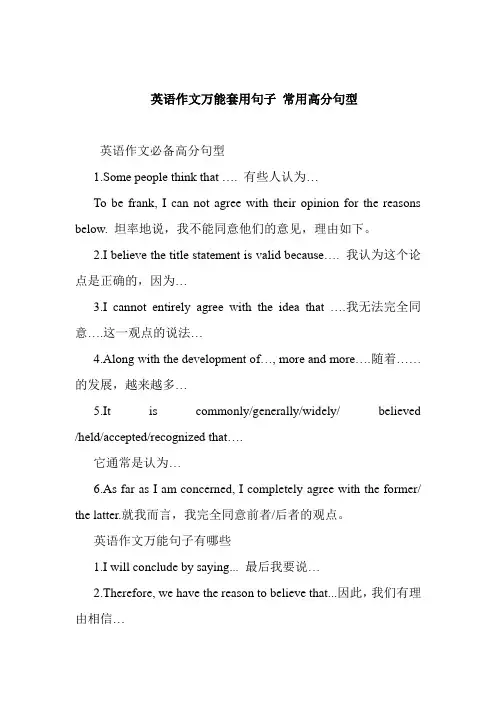
英语作文万能套用句子常用高分句型英语作文必备高分句型1.Some people think that …. 有些人认为…To be frank, I can not agree with their opinion for the reasons below. 坦率地说,我不能同意他们的意见,理由如下。
2.I believe the title statement is valid because…. 我认为这个论点是正确的,因为…3.I ca nnot entirely agree with the idea that ….我无法完全同意….这一观点的说法…4.Along with the development of…, more and more….随着……的发展,越来越多…5.It is commonly/generally/widely/ believed /held/accepted/recognized that….它通常是认为…6.As far as I am concerned, I completely agree with the former/ the latter.就我而言,我完全同意前者/后者的观点。
英语作文万能句子有哪些1.I will conclude by saying... 最后我要说…2.Therefore, we have the reason to believe that...因此,我们有理由相信…3.All things considered,总而言之= In a word=In conclusionIt may be safely said that...它可以有把握地说......4.Therefore, in my opinion,因此,在我看来,5.From what has been discussed above, we may safely draw the conclusion that…通过以上讨论,我们可以得出结论…6.The data/statistics/figures lead us to the conclusion th at…通过数据我们得到的结论是,....7.It can be concluded from the discussion that...从中我们可以得出这样的结论8.From my point of view, it would be better if...在我看来,如果……也许更好英语写作常用高级句子1. It is important for everyone to learn English well in our rapidly developing world.在这个迅速发展的世界里,对每个人来说,学好英语是非常重要的.同样句型包括:It is important/(necessary,difficult,convenient,possible)for sb. to do sth.2. The harder you work at it,the more progress you will make.你工作越努力,你取得的进步就越大.(1)The+比较级...,the+比较级...(2)比较级+and+比较级(The world is getting smaller and smaller.)3. If everyone makes a contribution to protecting the environment,the world will become much more beautiful.如果每个人都为保护环境做出贡献,世界会变得更加美好.类似的句型还有:If necessary…,they can…4. The best way to remember new words is to practice them everyday.记忆新单词最好的方法是每天操练这些单词.5. The atmosphere in my family is fantastic我的家庭气氛温馨和睦.6. The reason why people choose to live in the city is that the life is more convenient and colorful.人们为什么选择生活在城市的原因是因为城市的生活更方便、更多彩.7. I had a great first impression of American people.我对美国人民有了很好的第一印象.8. We have lots of confidence in our ability to solve any problem.我们对自己解决问题的能力有足够的信心.9.With the rapid development of modern technology,the Internet has become a necessary part of our daily life and work.随着现代科技的迅速发展,互联网已经成为生活和工作中必不可少的一部分.10. You should read as many books as you possibly can.大家应该尽可能的多读书.。
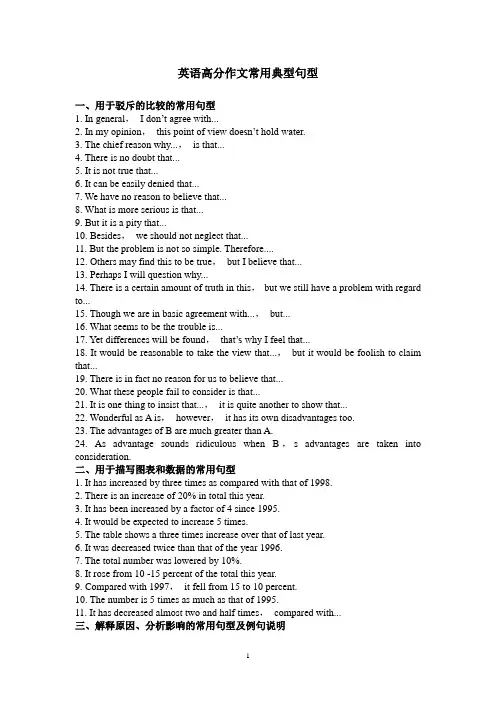
英语高分作文常用典型句型一、用于驳斥的比较的常用句型1. In general,I don’t agree with...2. In my opinion,this point of view doesn’t hold water.3. The chief reason why...,is that...4. There is no doubt that...5. It is not true that...6. It can be easily denied that...7. We have no reason to believe that...8. What is more serious is that...9. But it is a pity that...10. Besides,we should not neglect that...11. But the problem is not so simple. Therefore....12. Others may find this to be true,but I believe that...13. Perhaps I will question why...14. There is a certain amount of truth in this,but we still have a problem with regard to...15. Though we are in basic agreement with...,but...16. What seems to be the trouble is...17. Yet differences will be found,t hat’s why I feel that...18. It would be reasonable to take the view that...,but it would be foolish to claim that...19. There is in fact no reason for us to believe that...20. What these people fail to consider is that...21. It is one thing to insist that...,it is quite another to show that...22. Wonderful as A is,however,it has its own disadvantages too.23. The advantages of B are much greater than A.24. As advantage sounds ridiculous when B,s advantages are taken into consideration.二、用于描写图表和数据的常用句型1. It has increased by three times as compared with that of 1998.2. There is an increase of 20% in total this year.3. It has been increased by a factor of 4 since 1995.4. It would be expected to increase 5 times.5. The table shows a three times increase over that of last year.6. It was decreased twice than that of the year 1996.7. The total number was lowered by 10%.8. It rose from 10 -15 percent of the total this year.9. Compared with 1997,it fell from 15 to 10 percent.10. The number is 5 times as much as that of 1995.11. It has decreased almost two and half times,compared with...三、解释原因、分析影响的常用句型及例句说明1. Everybody knows that...2. It can be easily proved that...3. It is true that...4. No one can deny that...5. One thing which is equally important to the above mentioned is...6. The chief reason is that...7. We must recognize that...8. There is no doubt that...9. I am of the opinion that...10. This can be expressed as follows:11. To take..,for an example ....12. We have reason to believe that...13. Now that we know that...14. Among the most convincing reasons given,one should be mentioned...15. The change in... largely results from the fact that...16. There are several causes for this significant growth in...,first .... second...,finally...17. A number of factors could account for the development in...18. Perhaps the primary reason is...19. It is chiefly responsible for...20. The reasons for..,are complicated. And probably they are found in the fact...21. There are several possible reasons,except that...22. Somebody believes/ argues/ holds/ insists/ thinks that...23. It is not simple to give the reason for this complicated phenomenon...24. Different people observes it in different ways.例句说明1. There are many (different/several) reasons for this change (decrease/growth) of... For one thing,...For another,.... ,In addition,...例:There are several reasons for his decision of studying law. For one thing,he is very interested in social affairs and it seems the best way to enable him to engage in these activities. For another,his father is a lawyer,who has always encouraged him to do something similar. In addition,he is sure that he can get a job after graduation.2. A number of factors contribute to (something/doing)—. ...... and...例: A number of factors contribute to changing moral values--self-indulgence,the lack of social consciousness and the degeneration of the society itself.3. We may (regard/think of/take/consider) the (phenomenon/decrease/development) asa (n) (sign/evidence/symbol) of...,but the truth is that...例:We may take the change as a sign of social development,but the truth is that it will only lead to social corruption.4. The explanation for the phenomenon of ... involves many (different/complicated) factors.例:The explanation for the phenomenon of the rising teenage suicide rate involves many complicated factors. Some attribute the rise to an overemphasis on early success,others point to mounting peer pressure,and still others to confusion over changing social values.5. The reasons for ... are many,but for the most part center on...例:The reasons for poverty are many,but for the most part center on illiteracy,the lack of opportunities and in some cases pure laziness.四、有关文章、段落起始的常用句型I. With the (rapidly) growing popularity of Internet surfing ( computers /cars/mobile phones/pagers/.PDP television/... ) in China,the quality of our lives is improving for the better.2. With the (rapid) growth of our economy ( heavy industries/transportation system/market economy/population/private enterprises/housing industry/... ),an increasing number of problems,such as (water shortages/traffic jams/industrial pollution/ waste of energy/desert spreading/... ),are beginning to surface.3. As the proverb says... ( It goes without saying that... /Generally speaking,... /It is often said that... )4. With the (rapid) development of science and technology ( market economy/electronic industry/information industry/higher education/...) an increasing number of people come to realize that (knowledge is power/a weak nation has no International prestige/education is of vital importance/...).5. Currently,there is a widespread concern over drug abuse (high unemployment rate/wildlife extinction/environmental pollution/desertification/organized crime/widespread corruption/energy crisis/water shortages/traffic jams/increasing traffic accidents/... ).6. It is quite clear that (Them is no doubt that/ Some people believe that)..,because...7. There is a wide spread concern that many large state-owned companies are in deficit (quite a few Chinese cities face the problem of water shortages,industrial pollution and waste of energy/various kind of superstition flare up/... )8. The government is (We are) seriously concerned with wildlife extinction (drug abuse/widespread corruption/organized crimes/high unemployment rate/...).9. Many people often ask such question:”...’? ( More and more people have come to realize...)10. In the past two decades ( In the past five years),millions of private enterprises( private schools/supermarkets/fast food restaurants/... ) have mushroomed all over China.11. In recent years,many Chinese families have owned cars (computers/mobile phones/video cameras/houses/... ).12. Recently the issue of... has been brought to public attention. (Currently there is a widespread concern that... /Now people in growing number are coming to realize that... )13. Nowadays,a heated debate (discussion) about the accession to WTO (private cars/stocks/brain-drain/Chinas football/... ) is under way in China.14. As the market economy (the legal system/the living standard/the higher education system/the highway network/the infrastructure/...) improves in China,free competition will increasingly replace all sorts of monopolies.15. One great man said that...16. As the public awareness of the market economy (population control/socialism andcommunism/wildlife preservation/environmental protection/higher education/human rights/anti-monopoly/creativity/competition/laws and regulations/...) heightens,the gap between China and the developed countries will gradually vanish (many social problems will be solved gradually).17. Recently,extensive studies (statistics/surveys/investigations/...) show (reveal/indicate/demonstrate/prove/...) that 107 Chinese cities and 1231 small towns suffer water shortages.18. These days we often tell that...,but is this really the case?19. There are three major values of owning a car (a computer/an apartment/a mobile phone/a beeper/...). To begin with .... Next .... Last .... There are,on the other hand,more reasons against it. First (ly)... Second (ly) .... Finally ..... 20. There are some reasons for owing a car ( traffic accidents/big fires in big cities/water shortages/destruction of virgin forests/... ).21. In the past several years there has been...22. Now an increasing number of people come to realize that time is money ( knowledge is power/science and technology energize economic growth/we must learn to live in harmony with wildlife/weak nation has no international prestige/cheating never pays/science and technology constitute the primary productive force/... ).23. There are three basic differences between the large and small universities (cities and countryside/ceramics and plastics materials/... ). In the small university,you... In the large university,you...24. There are various ways (at least three ways/possible techniques/problems/methods/approaches/... ) to do something.25. Now it is commonly held that... but I doubt whether...26. The policy ( The president/The major/The reform/The bidding for the 2008 Olympic Summer Games) enjoys grass-root support for three main reasons,27. Smoking (alcoholic beverage/Drugs/Guns/Firecrackers/... ) should be banned from college campuses for two reasons. The first reason is that... The other reason is that... (on the one hand .... On the other hand .... )28. There is a general discussion today about the issue of...29.No pains,no gains. No money,no honey (friendship/work/promotion/admission/love/assistance/service/justice/... ). No shirt ( shoes ) ,no admission.30. We enjoy Internet surfing not because we are curious about new things,but because Internet represents the latest technology.31. The possible solutions of the energy crisis (water shortages/desertification/pollution/theses social problems/... ) depends on three factors (and on specific situations ) ...32.Faced with .... quite a few people argue that...,but other people conceive differently.33. How successful your job interview will be depends upon your qualification,your professional experience and your academic intelligence,and upon such factors as your social skills,your personality,your appearance and a piece of good luck.34. The three major reasons affecting (responsible for) the rapid economic growth(the widespread corruption/traffic accidents/fires/wildlife extinction/the floods/desert spreading/the collapse of new building/traveling fever/energy crisis/grass land decaying/...) are A,B,and C.35. Different people have different attitudes towards the biding of the 29th Olympic Games (access to WTO/private cars/high unemployment rate/Internet surfing/private schools/state monopoly of telecommunication/urbanization/stock... ) Some are in favor of... while others are against...36. When it comes to the access to WTO (Internet surfing/private schools/brain-drain/e-business/high rate of unemployment/China’s football/recycling/widespread corruption/... ),most people believe that..,but other people argue that...37. The high unemployment rate fuels the competition in the job market ( social unrest/the confrontation between rich and poor/the higher-education fever/organized crime/the grass-root hatred against corruption,injustice and crime/... ).38. To lend or not to lend money to a friend (To be or not to be married) depends or specific situations.39. Heightened environmental consciousness,changing trade patterns and emerging technologies (Global coverage of Internet,access to WTO and all round open-up: to the world) are all having a major impact on Chinese heavy industries ( English education in China).40. For years,extensive research efforts have been focused (centered) on decoding the book of life (development of optical computers/elimination of desertification/human organ transplantation/... ).41. Nowadays,fire (corruption/higher education/drug abuse/pollution/wildlife extinction/Internet surfing/private cars/accession to WTO/biding the 30th Olympic Games/organized crime/mobile phones/unemployment/ high divorce rate/ greenhouse effect/brain-drain/private schools/7-day holidays tourism/... ) has/ have become a focus of attention.42. The case only reveals (exposes) the tip of an ugly iceberg of the organized crime(widespread corruption/serious environmental pollution/the lack of reverence for laws and regulations/...).43. With the aggressive conquering of nature,we are facing the serious problem of environmental pollution (exhaustion of natural resources/extinction of wildlife/... ). 44. In spite of these problems of the private companies in China (the home-made instruments/private cars/joint ventures),their strengths far outweigh their weaknesses.45. All these reports reveal a painful face that corruption Is rapidly spreading like wild fire all over China; it invades every pore of our society,fueling rages of common people,hurting the international prestige,and threatening the safety of our nation.46. As far as recycling (family planning/environment protection/adult education) is concerned,there is still much room for improvement.47. Mastery of English vocabulary (Fighting crimes/Wiping out fake products/Cleaning up industrial pollution/Eradicating superstitions/Passing theNational College Entrance Exams/Getting a high score in GRE/Earning tuition by students alone/... ) is no picnic.48. Good manners (Social skills/Good will/Sincerity/Honesty) open (s) the door to friendship (success/grass-roots support/popularity among fellow students/... ).例句说明1. When asked about the (question/problem/matter) ,(some/many/most/few)( students/people/scientists/... )例:When asked about the ongoing uproar involving U.S. President Bill Clinton,most people say the affair involves a purely private matter. But many other people regard his actions as deplorable. I personally think the president committed impeachable offences.2. When it comes to (sports/seeking jobs) ,(some people/John/...) 例: When it comes to the increasing use of motor vehicles in Beijing,some people think that use should be limited. Others argue that the opposite is true. There is probably some truth to both arguments,but emission controls must be instituted regardless of the number of vehicles.3. According to a (n) (survey/study/investigation) ,there is a (n) (increasing/growing/decreasing) numbers of...例:According to the latest survey,there is a growing number of people who support the plan.4. It is (an accepted fact that/widely known/widely acknowledged) that...例:it is widely acknowledged that extensive deforestation contributed to heavy summer flooding. Experts argue that China must introduce a massive afforestation program. But I doubt whether afforestation alone will solve the problem.5. Nowadays { more and more/many/few} (people/students/women/men) are beginning to ( realize/be aware of/be alert to/notice) the ( importance/significance/greatness/seriousness ) of ( education/science/situation/pollution ) 例:Nowadays many people believe that capital punishment deters crimes. But al though criminologists have conducted exhaustive research regarding the subject,little evidence exists to support the claim.6. (some/most/many) (people/students/women) are of the opinion that...例:Most people are of the opinion that wealth provides solutions to all problems. But spite of the material benefits wealth provides,I believe one should abandon the pursuit of materialism and instead concentrate on the pursuit of happiness.五、有关文章和段落结尾的常用短语、句型1.Without computer (cell telephone/PDP television/cars/microelectronics/telecommunication/Internet/genetics advances/... ),it would he difficult to imagine modern life.2.From this point of view,we can see... ( On account of this we can find that,.. /Therefore,these findings reveal the following information: )3.We should redouble our efforts to build China into a powerful / prosperous/better educated/... ) nation with international prestige.4. We should do our best in eliminating industrial pollution (fake products/organized crimes/illiteracy/poverty in China...).5. In a word (In conclusion/To sum up).6. It is imperative for us to take effective measures to correct the situation ( fight corruption/hold back a tidal wave of crime/terminate excessive exploitation of natural resources/ease water shortages/... ).7. It is imperative for us to protect wildlife (to eliminate environmental pollution/to fight against organized crimes/to get ride of fake products/to ban drug abuse/to reduce traffic accidents/... ),now,before it is too late.8. Thus,this is the reason why (As far as... be concerned,I believe that/There is little doubt that / It is obvious that) we must...9. Mankind must put an end to war (pollution/desertification/wildlife destruction/hegemony/nuclear weapons/...) or war (pollution/... ) will put an end to mankind.10. It is not what you say ( learn/promise/know/love to do/think you can do/you feel capable of doing/...) but what you do (have done) that really counts.11. There is no immediate solution to the problem of .... but..,might be helpful. ( None of the solutions is quite satisfactory. The problem should be examined in a new way. )12. In the race for quality ( knowledge/excellence/efficiency/creativity/truth/happiness/scientific exploration/technological innovation/... ),there is no finish line.13. At best,he does not tell the truth; at worst,he is not equal to his job.14. The problem is not the death of one man (that we cannot do it); the problem is the life of this organization (that we hate to do such nasty things).15. In order to make our world a better place in which to live,we must learn to live in harmony with all wildlife species (stop polluting our environment right away/conscientiously follow family planning).16. It is high time that we put considerable emphasis on... (Taking into account all these factors,we may safely reach the conclusion that... /The result is dependent on... )17. In short,(population explosion,environmental pollution and exhaustion of natural resources) are the major problems to be solved to make our would a better place in which to live.18. To conclude,carelessness in handling fires,misuse of flammable liquids and abuse of electrical appliances are the three major fire hazards around us (heightened environmental awareness,changing trade patterns and emerging technology are having an major compact on our economy).19. Computer (Internet/Integrated circuit/Electricity/Telephone/Television/Plastics/Science and technology/Mobile phones/Cars/Airplane/semiconductors/genetic engineering/... ) revolutionizes our life (industry/economy).20. Let us work hand in hand to solve these social problems (fight against corruption / hold back a tidal wave of crimes / build China into a powerful nation /...).21. I want to be a teacher (a doctor/or to do something) not only because...,but also because...22. Who is to say that China will not be humiliated again (Chinese scientists may not provide a better theory)?23. It goes without saying that science and technology constitute the primary productive force (knowledge is something/creativity is everything/cheating never pays/...)24. The nearer the dawn,the darker the night. (The more..,the more. )25. Living in harmony with nature (wildlife) has become a part of modern civilization.26. The state-owned enterprises (The township enterprises) have only two choices: solve these longstanding problems through reforms or go bankrupt.27. We should not let the golden opportunity slip by,On the contrary,we should seize any opportunity and face the challenge with confidence,courage and wisdom. 例句说明1. There is no (predicting/knowing/denying) that...例:There is no predicting that when this situation will become better.2. (clearly/undoubtedly/obviously/consequently),( good health/education/a good sense/friendship) is (important/of great importance/valuable/worth while) for...例: Clearly,to be well-educated is of great importance for the change of my current situation.3. ( For my part/As far as I am concerned/In my mind’s eye) ,I believe that there is no(simple solution/quick answer/effective method) to the (issue/problem) of .... but... might be (helpful/plausible/practical).例: As far as I am concerned,I believe that there is no simple solution to that problem,but taking some advice from professionals might be helpful.4. It is (urgent/necessary/imperative/important) that (measures/steps) be taken to... 例: lt is urgent that steps be taken to prevent people from cutting trees.5. It is high time that (we/the government/students/people) did...例:It is high time that we put an end to the deplorable practice of infanticide.六、用于论证和说明的常用短语、句型1. As it is described that...2. It has been illustrated that...3. It provides a good example of...4. We may cite another instance of...5. History may provide us with the examples of.,.6. A number of further facts may be added...7. The situation is not unique,it is typical of dozens have heard.8. A recent investigation indicates that...9. According to the statistics provided...10. According to a latest study,it can be predicted..11. There is no sufficient evidence to show that...12. All available evidence points to the fact that...13. Examples given lead me to conclude that...14. It reveals the unquestionable fact that...15. The idea may be proved by facts...16. All the facts suggest that...17. No one can deny the fact that...18. We may face the undeniable fact that...例句说明1. No one can (deny/ignore) the fact that...例:No one can deny the fact that our country has the largest population in the world.2. As can be (seen/suggested) from the above (analysis/explanation)....例:As can be seen from the above explanation,there is no doubt that the number of private cars will increase drastically in a few years.3. Take for example,a (n) (person who/matter that/affair which)....例:Take for example,Yangtze River that once had been regarded as one of the cleanest rivers in the world now is serious staminated.4. It can be (inferred/concluded) that...例:lt can be inferred that no matter how difficult the situation is,the government will never give up.5. My(idea/view/belief) may be (proved of/illustrated that/supported by...).例: My view may be supported by the fact that more and more people are withdrawing from the city to the countryside.。
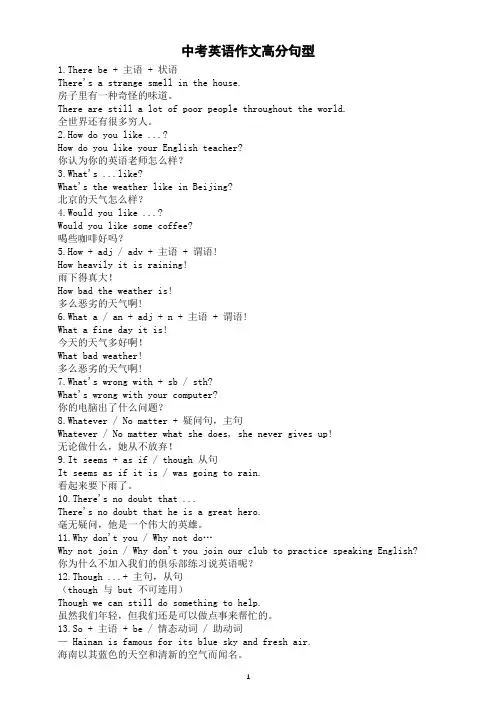
中考英语作文高分句型1.There be + 主语 + 状语There's a strange smell in the house.房子里有一种奇怪的味道。
There are still a lot of poor people throughout the world.全世界还有很多穷人。
2.How do you like ...?How do you like your English teacher?你认为你的英语老师怎么样?3.What's ...like?What's the weather like in Beijing?北京的天气怎么样?4.Would you like ...?Would you like some coffee?喝些咖啡好吗?5.How + adj / adv + 主语 + 谓语!How heavily it is raining!雨下得真大!How bad the weather is!多么恶劣的天气啊!6.What a / an + adj + n + 主语 + 谓语!What a fine day it is!今天的天气多好啊!What bad weather!多么恶劣的天气啊!7.What's wrong with + sb / sth?What's wrong with your computer?你的电脑出了什么问题?8.Whatever / No matter + 疑问句,主句Whatever / No matter what she does, she never gives up!无论做什么,她从不放弃!9.It seems + as if / though 从句It seems as if it is / was going to rain.看起来要下雨了。
10.There's no doubt that ...There's no doubt that he is a great hero.毫无疑问,他是一个伟大的英雄。
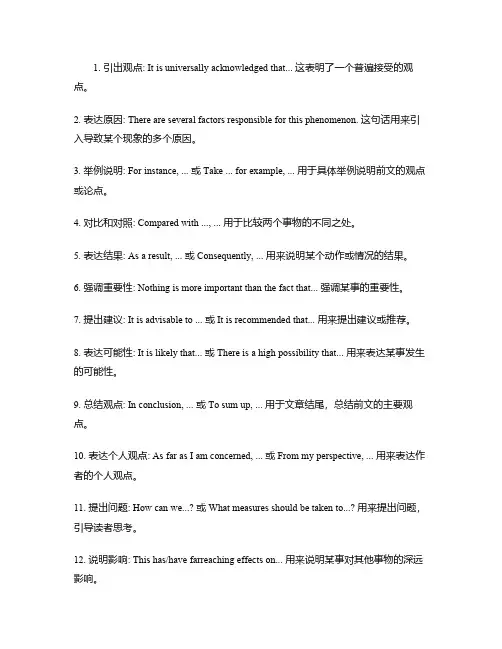
1.引出观点:It is universally acknowledged that...这表明了一个普遍接受的观点。
2.表达原因:There are several factors responsible for this phenomenon.这句话用来引入导致某个现象的多个原因。
3.举例说明:For instance,...或Take...for example,...用于具体举例说明前文的观点或论点。
4.对比和对照:Compared with...,...用于比较两个事物的不同之处。
5.表达结果:As a result,...或Consequently,...用来说明某个动作或情况的结果。
6.强调重要性:Nothing is more important than the fact that...强调某事的重要性。
7.提出建议:It is advisable to...或It is recommended that...用来提出建议或推荐。
8.表达可能性:It is likely that...或There is a high possibility that...用来表达某事发生的可能性。
9.总结观点:In conclusion,...或To sum up,...用于文章结尾,总结前文的主要观点。
10.表达个人观点:As far as I am concerned,...或From my perspective,...用来表达作者的个人观点。
11.提出问题:How can we...?或What measures should be taken to...?用来提出问题,引导读者思考。
12.说明影响:This has/have farreaching effects on...用来说明某事对其他事物的深远影响。
13.使用条件句:If...,...will...用来表达条件和结果的关系。
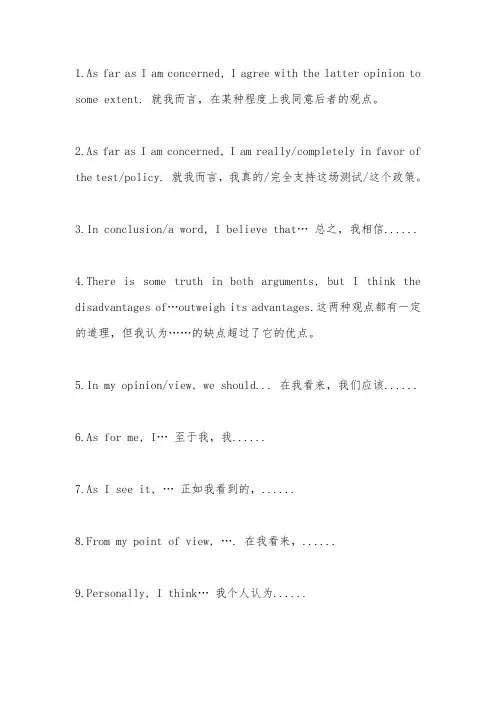
1.As far as I am concerned, I agree with the latter opinion to some extent. 就我而言,在某种程度上我同意后者的观点。
2.As far as I am concerned, I am really/completely in favor of the test/policy. 就我而言,我真的/完全支持这场测试/这个政策。
3.In conclusion/a word, I believe that…总之,我相信......4.There is some truth in both arguments, but I think the disadvantages of…outweigh its advantages.这两种观点都有一定的道理,但我认为……的缺点超过了它的优点。
5.In my opinion/view, we should... 在我看来,我们应该......6.As for me, I…至于我,我......7.As I see it, …正如我看到的,......8.From my point of view, …. 在我看来,......9.Personally, I think…我个人认为......10.My view is that…我的观点是......11.I think/consider…我认为/考虑......12.I take/hold a negative/positive view of…我对......采取/保持消极的/积极的看法。
13.There are several reasons for…, but in general, they come down to three major ones... 有一些原因,但总的来说,归结为三大原因。
14.There are many factors that may account for…, but the following are the most typical ones. 有很多因素可以解释...…,但以下是最典型的因素。
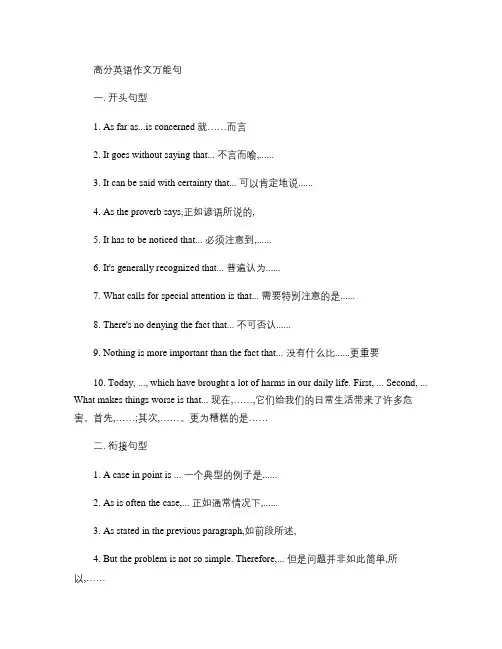
高分英语作文万能句一. 开头句型1. As far as...is concerned 就……而言2. It goes without saying that... 不言而喻,......3. It can be said with certainty that... 可以肯定地说......4. As the proverb says,正如谚语所说的,5. It has to be noticed that... 必须注意到,......6. It's generally recognized that... 普遍认为......7. What calls for special attention is that... 需要特别注意的是......8. There's no denying the fact that... 不可否认......9. Nothing is more important than the fact that... 没有什么比......更重要10. Today, ..., which have brought a lot of harms in our daily life. First, ... Second, ... What makes things worse is that... 现在,……,它们给我们的日常生活带来了许多危害。
首先,……;其次,……。
更为糟糕的是……二. 衔接句型1. A case in point is ... 一个典型的例子是......2. As is often the case,... 正如通常情况下,......3. As stated in the previous paragraph,如前段所述,4. But the problem is not so simple. Therefore,... 但是问题并非如此简单,所以,……5. But it's a pity that... 但遗憾的是…...6. For all that... 对于这一切......In spite of the fact that... 尽管事实......7. Further, we hold opinion that... 此外,我们坚持认为......8. However , the difficulty lies in... 然而,困难在于...…9. Similarly, we should pay attention to... 同样,我们要注意......10. In view of the present station,鉴于目前形势,11. As has been mentioned above,正如上面所提到的,12. In this respect, we may as well say... 从这个角度上我们可以说......13. However, we have to look at the other side of the coin, that is... 然而我们还得看到事物的另一方面,即…...三. 结尾句型1. I will conclude by saying... 最后我要说…...2. Therefore, we have the reason to believe that... 因此,我们有理由相信…...3. All things considered, 总而言之,4. Therefore, in my opinion, it's more advisable... 因此,在我看来,更可取的是…...5. From what has been discussed above, we may safely draw the conclusion that…通过以上讨论,我们可以得出结论...…6.The data/statistics/figures lead us to the conclusion that…通过数据我们得到的结论是......7. It can be concluded from the discussion that... 从讨论中可以得出......的结论8. From my point of view, it would be better if... 在我看来,如果……也许更好四. 举例句型1. Let's take...to illustrate this. 让我们用......来阐明这一点。
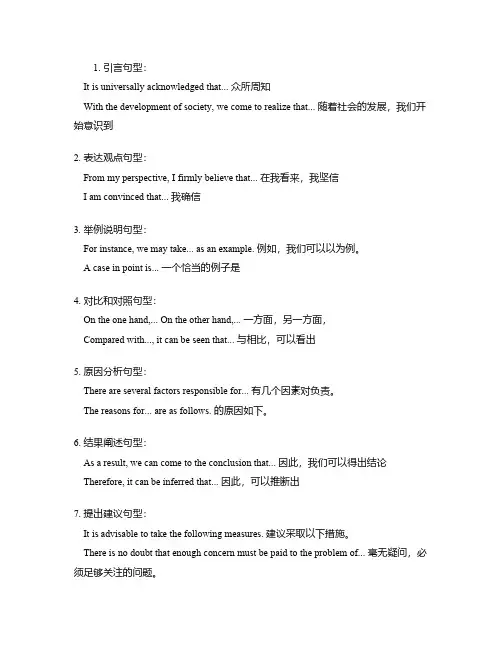
1.引言句型:It is universally acknowledged that...众所周知With the development of society,we come to realize that...随着社会的发展,我们开始意识到2.表达观点句型:From my perspective,I firmly believe that...在我看来,我坚信I am convinced that...我确信3.举例说明句型:For instance,we may take...as an example.例如,我们可以以为例。
A case in point is...一个恰当的例子是4.对比和对照句型:On the one hand,...On the other hand,...一方面,另一方面,Compared with...,it can be seen that...与相比,可以看出5.原因分析句型:There are several factors responsible for...有几个因素对负责。
The reasons for...are as follows.的原因如下。
6.结果阐述句型:As a result,we can come to the conclusion that...因此,我们可以得出结论Therefore,it can be inferred that...因此,可以推断出7.提出建议句型:It is advisable to take the following measures.建议采取以下措施。
There is no doubt that enough concern must be paid to the problem of...毫无疑问,必须足够关注的问题。
8.总结句型:In conclusion,it is imperative that...总之,是必要的。
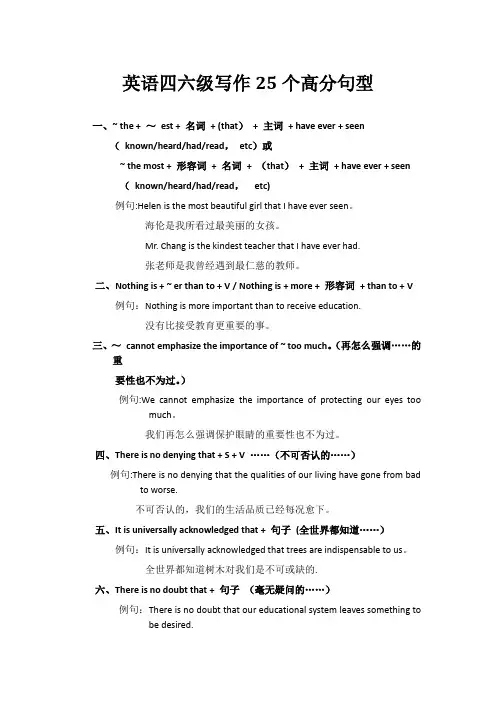
英语四六级写作25个高分句型一、~ the + ~est + 名词+ (that)+ 主词+ have ever + seen(known/heard/had/read,etc)或~ the most + 形容词+ 名词+ (that)+ 主词+ have ever + seen(known/heard/had/read,etc)例句:Helen is the most beautiful girl that I have ever seen。
海伦是我所看过最美丽的女孩。
Mr. Chang is the kindest teacher that I have ever had.张老师是我曾经遇到最仁慈的教师。
二、Nothing is + ~ er than to + V / Nothing is + more + 形容词+ than to + V例句:Nothing is more important than to receive education.没有比接受教育更重要的事。
三、~cannot emphasize the importance of ~ too much。
(再怎么强调……的重要性也不为过。
)例句:We cannot emphasize the importance of protecting our eyes too much。
我们再怎么强调保护眼睛的重要性也不为过。
四、There is no denying that + S + V ……(不可否认的……)例句:There is no denying that the qualities of our living have gone from bad to worse.不可否认的,我们的生活品质已经每况愈下。
五、It is universally acknowledged that + 句子(全世界都知道……)例句:It is universally acknowledged that trees are indispensable to us。
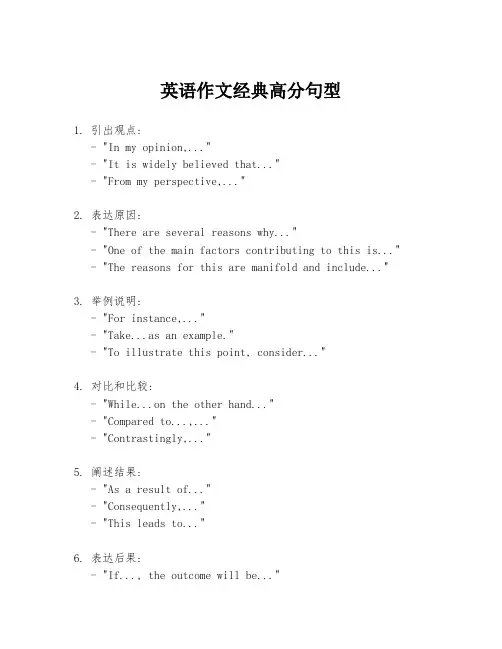
英语作文经典高分句型1. 引出观点:- "In my opinion,..."- "It is widely believed that..."- "From my perspective,..."2. 表达原因:- "There are several reasons why..."- "One of the main factors contributing to this is..." - "The reasons for this are manifold and include..."3. 举例说明:- "For instance,..."- "Take...as an example."- "To illustrate this point, consider..."4. 对比和比较:- "While...on the other hand..."- "Compared to...,..."- "Contrastingly,..."5. 阐述结果:- "As a result of..."- "Consequently,..."- "This leads to..."6. 表达后果:- "If..., the outcome will be..."- "The consequences of... are severe."- "Failing to... could result in..."7. 提出建议:- "It is advisable to..."- "It would be beneficial if..."- "One possible solution is..."8. 总结全文:- "In conclusion,..."- "To sum up,..."- "In summary,..."9. 强调重要性:- "It is of great importance that..."- "The significance of... cannot be overstated." - "It is imperative to..."10. 提出问题:- "What is worth considering is..."- "How can we...? This is a question that..." - "One might ask, why is...?"11. 表达可能性:- "It is possible that..."- "There is a chance that..."- "It could be argued that..."12. 引用他人观点:- "As [Author] once said,..."- "According to [Expert],..."- "Citing [Source],..."13. 表达转折:- "However,..."- "Nevertheless,..."- "Despite this,..."14. 强调事实:- "It is a fact that..."- "Undoubtedly,..."- "It is undeniable that..."15. 使用过渡词:- "Furthermore,..."- "Moreover,..."- "Additionally,..."使用这些句型可以帮助你构建一个结构清晰、逻辑严密的英语作文,从而获得高分。
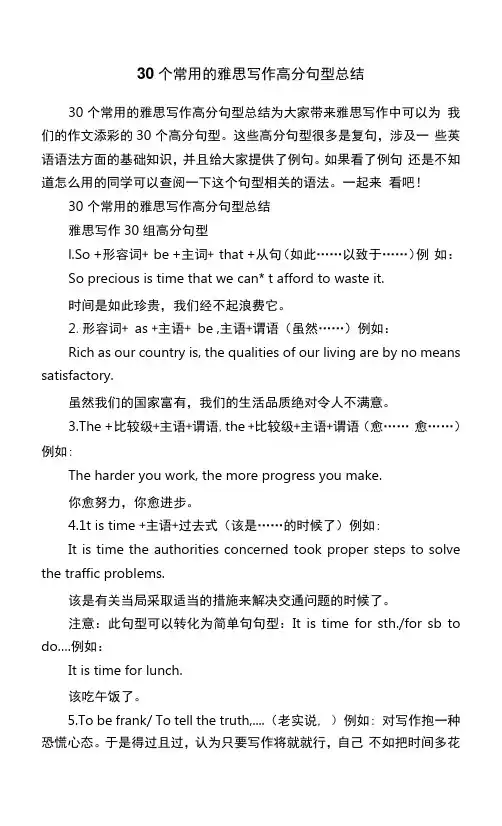
30个常用的雅思写作高分句型总结30个常用的雅思写作高分句型总结为大家带来雅思写作中可以为我们的作文添彩的30个高分句型。
这些高分句型很多是复句,涉及一些英语语法方面的基础知识,并且给大家提供了例句。
如果看了例句还是不知道怎么用的同学可以查阅一下这个句型相关的语法。
一起来看吧!30个常用的雅思写作高分句型总结雅思写作30组高分句型l.So +形容词+ be +主词+ that +从句(如此……以致于……)例如:So precious is time that we can* t afford to waste it.时间是如此珍贵,我们经不起浪费它。
2.形容词+ as +主语+ be ,主语+谓语(虽然……)例如:Rich as our country is, the qualities of our living are by no means satisfactory.虽然我们的国家富有,我们的生活品质绝对令人不满意。
3.The +比较级+主语+谓语,the +比较级+主语+谓语(愈…… 愈……)例如:The harder you work, the more progress you make.你愈努力,你愈进步。
4.1t is time +主语+过去式(该是……的时候了)例如:It is time the authorities concerned took proper steps to solve the traffic problems.该是有关当局采取适当的措施来解决交通问题的时候了。
注意:此句型可以转化为简单句句型:It is time for sth./for sb to do….例如:It is time for lunch.该吃午饭了。
5.To be frank/ To tell the truth,....(老实说, )例如: 对写作抱一种恐慌心态。
于是得过且过,认为只要写作将就就行,自己不如把时间多花在听力和阅读上来帮自己〃拉分〃。
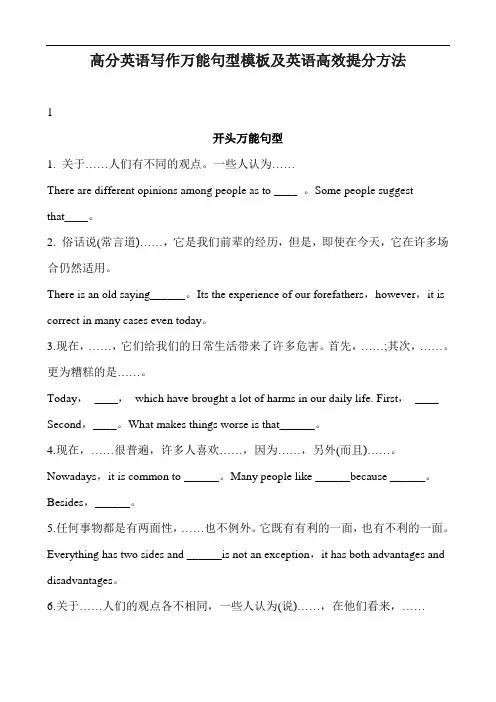
高分英语写作万能句型模板及英语高效提分方法1开头万能句型1. 关于……人们有不同的观点。
一些人认为……There are different opinions among people as to ____ 。
Some people suggestthat____。
2. 俗话说(常言道)……,它是我们前辈的经历,但是,即使在今天,它在许多场合仍然适用。
There is an old saying______。
Its the experience of our forefathers,however,it is correct in many cases even today。
3.现在,……,它们给我们的日常生活带来了许多危害。
首先,……;其次,……。
更为糟糕的是……。
Today,____,which have brought a lot of harms in our daily life. First,____ Second,____。
What makes things worse is that______。
4.现在,……很普遍,许多人喜欢……,因为……,另外(而且)……。
Nowadays,it is common to ______。
Many people like ______because ______。
Besides,______。
5.任何事物都是有两面性,……也不例外。
它既有有利的一面,也有不利的一面。
Everything has two sides and ______is not an exception,it has both advantages and disadvantages。
6.关于……人们的观点各不相同,一些人认为(说)……,在他们看来,……People’s opinions about ______ vary from person to person.Some people say that______。
英语作文万能套用句子 常用高分句型英语作文必备高分句型英语作文必备高分句型1.Some people think that …. 有些人认为…To be frank, I can not agree with their opinion for the reasons below. 坦率地说,我不能同意他们的意见,理由如下。
坦率地说,我不能同意他们的意见,理由如下。
2.I believe the title statement is valid because…. 我认为这个论点是正确的,因为…3.I ca nnot entirely agree with the idea that ….我无法完全同意….这一观点的说法…4.Along with the development of…, more and more….随着……的发展,越来越多…5.It is commonly/generally/widely/ believed /held/accepted/recognized that….它通常是认为…6.As far as I am concerned, I completely agree with the former/ the latter.就我而言,我完全同意前者/后者的观点。
后者的观点。
英语作文万能句子有哪些英语作文万能句子有哪些1.I will conclude by saying... 最后我要说…2.Therefore, we have the reason to believe that...因此,我们有理由相信…3.All things considered,总而言之总而言之= In a word=In conclusionIt may be safely said that... 它可以有把握地说......4.Therefore, in my opinion, 因此,在我看来,因此,在我看来,5.From what has been discussed above, we may safely draw the conclusion that…通过以上讨论,我们可以得出结论…6.The data/statistics/figures lead us to the conclusion th at… 通过数据我们得到的结论是,....7.It can be concluded from the discussion that...从中我们可以得出这样的结论出这样的结论8.From my point of view, it would be better if...在我看来,如果……也许更好也许更好英语写作常用高级句子英语写作常用高级句子1. It is important for everyone to learn English well in our rapidly developing world.在这个迅速发展的世界里,对每个人来说,学好英语是非常重要的.同样句型包括:It is important/(necessary ,difficult , convenient , possible )for sb. to do sth.2. The harder you work at it, the more progress you will make. 你工作越努力,你取得的进步就越大.(1)The+比较级..., the+比较级...(2)比较级+and+比较级(The world is getting smaller and smaller.)3. If everyone makes a contribution to protecting the environment, the world will become much more beautiful.如果每个人都为保护环境做出贡献,世界会变得更加美好.类似的句型还有:If necessary…, they can…4. The best way to remember new words is to practice themeveryday.记忆新单词最好的方法是每天操练这些单词.5. The atmosphere in my family is fantastic我的家庭气氛温馨和睦.6. The reason why people choose to live in the city is that the lifeis more convenient and colorful.人们为什么选择生活在城市的原因是因为城市的生活更方便、更多彩.7. I had a great first impression of American people.我对美国人民有了很好的第一印象.8. We have lots of confidence in our ability to solve any problem.我们对自己解决问题的能力有足够的信心.9.With the rapid development of modern technology, the Internet has become a necessary part of our daily life and work.随着现代科技的迅速发展,互联网已经成为生活和工作中必不可少的一部分.10. You should read as many books as you possibly can.大家应该尽可能的多读书.。
高中英语作文的万能高分句型一、开头句型1. A recent survey shows that…2.It is widely believed that…3.Many people insist that…4.It is generally accepted that…5.With the development of…二、中间句型1.Moreover,…2.Furthermore,…3.In addition,…4.As a result,…5.What’s more,…6.Besides,…三、结尾句型1.In conclusion,…2.In a word,…3.To sum up,…4.Therefore,…5.To conclude,…四、考虑两方面1.On one hand,…2.On the other hand,…3.On one side,…4.On the contrary,…5.However,…6.Despite this,…7.Nevertheless,…五、解决问题1.The key to solving this problem is…2.One possible solution to this problem is…3.It is urgent that we take action to…4.To address this issue, it is essential that we…六、建议措施1.It is recommended that…2.We should take measures to…3.It is advisable to…4.One effective way to…5.It is crucial that we…七、引用观点1.According to a famous saying,…2.It is believed by many that…3.As the saying goes,…4.It has been pointed out that…5.Some people argue that…八、表达个人观点1.In my opinion,…2.From my point of view,…3.Personally, I believe that…4.As far as I am concerned,…5.I strongly believe that…九、讲述例子1.For instance,…2.Take… for example,…3. A good example is…4.This can be illustrated by…5.As an illustration,…十、描述优点与缺点1.One advantage of… is that…2.Another benefit is…3.On the other hand, a disadvantage is…4.Despite its advantages,…5.However, it also has its drawbacks,…以上是高中英语作文写作中常用的句型,希望能对你的英语写作有所帮助。
英语作文万能高分句型1. In my opinion, the most important thing in life is happiness. Without happiness, everything else becomes meaningless.2. It is widely acknowledged that education plays a crucial role in shaping a person's future. Therefore, it is essential for everyone to have access to quality education.3. The world is becoming increasingly interconnected, and it is more important than ever to be able to communicate effectively in English. English has become the global language of business, science, and technology.4. Climate change is one of the most pressing issues facing our planet today. It is imperative that we take action to reduce our carbon footprint and protect the environment for future generations.5. Technology has revolutionized the way we live, work,and communicate. While it has brought many benefits, it has also created new challenges, such as cyberbullying and addiction to social media.6. Traveling is a great way to broaden your horizons and learn about different cultures. It allows you to step outside your comfort zone and gain new perspectives on the world.7. Health is wealth, and we should all prioritize taking care of our physical and mental well-being. This includes eating a balanced diet, getting enough exercise, and seeking help when we need it.8. Diversity is a strength, and we should celebrate our differences rather than fear them. By embracing diversity, we can create a more inclusive and tolerant society.9. Success is not just about achieving your goals, but also about the journey you take to get there. It is important to enjoy the process and learn from your failures along the way.10. Kindness is a powerful force that can make a real difference in the world. By showing kindness to others, we can create a ripple effect that spreads positivity and compassion.。
初中英语作文高分句型整理◎满分必用句型1. It’s important/necessary for sb. to do sth.做...对某人很重要/必要It’s important for us to protect the environment.保护环境对我们很重要2. too + a./ad. + to do sth.太...,而不能...For me, physics is too hard to learn well.对我来说,物理太难而学不到太好。
3. so...that...如此...以致...The underground is so crowded that I won’t take it.地铁往往如此拥挤,以致于我不想坐地铁。
4. not...until... 直到...才...We can not feel the importance of eyesight until we fail to see something clearly. 直到我们不能清楚地看东西的时候,我们才感觉到视力的重要性。
5. The reason why...is that... ...的原因是The reason why our eyesight becomes poor is that we spend too much time on the screen.我们视力变差的原因是我们花太多时间在电子屏上。
6. There’s no doubt that...毫无怀疑There’s no doubt that looks are important for all of us.毫无怀疑,外貌对我们所有人来说都很重要。
7. There’s no need to do...做...没有必要There’s no need to care too much about our looks.没有必要太在意我们的外表。
作文中高分句式1、"司空见惯"句式①It is not uncommon/unusual (for sb) to do sth②It is not rare that③It is not rare for sb to do sth2、"难以逃脱"句式①Few people / No one can avoid/escape doing sth②Few people / No one can escape from sth③Few people / No one can be free from sth3、"因果"句型(1) The reason for sth is that(2) The cause of sth is that(3) The reason why + 句子1 is that + 句子2(4)、So + 形容词+ be + 主语+ that + 句子So anxious are people to develop the economy that they ignore the environment.(5)、enable sb to do sth 使得某人能做某事People have easy access to the Internet, which enables them to send and receive e-mails whenever they like.Due to/ owing to/thanks to + N / the fact that + 句子5、"影响"句型 have a lasting/negative/positive influence on sb/sthAs can be seen from this picture, what our parents say or do will have great influence on children's growth.6、对....有好处do good to = be beneficial tobenefit=sth is of great benefit .对....有坏处do harm to = be harmful to = (be detrimental to)= pose a great threat to = pose great threats to7、"努力"句型do one's utmost to + V = try/do one's bestSpare no effort to + Vtake great pains to do sthMake every effort to do sthEvery effort should be/has been made to do sth8、"引起关注"句型Recently, the problem of ... has aroused people's / worldwide / nationwide concern.Recently, the issue of ... has drawn people's / worldwide / nationwide attention.At present, the issue of ... has caused / aroused great concern among ...At present, the issue of ... has drawn public attention.Nowadays, there is a growing concern over ...Currently, people have been focusing on XXRecently, the problem of ... has been brought into focus.Recently, the phenomenon of... has become a heated topic.Recently, there is a heated discussion about sth9."采取行动"句型We should take effective measures to cope with this problem.Effective measures should be taken to cope with/ deal with/ handle this serious situation.We should take immediate action to cope with this problem.Immediate action should be taken to cope with this problem.It is high time/ about time sb should do sth.It is high time/ about time sb did sth.It is high time/ about time sb put an end to sthIt is high time/about time we took immediate action to10."反映"句型The cartoon reflects a universal phenomenon in our everyday life.The picture mirrors a common phenomenon in our daily life.。
英语写作高分句型一、谚语篇1. A good beginning is half done.良好的开端是成功的一半。
2.Actions speak louder than words.事实胜于雄辩。
3. A friend in need is a friend indeed.患难见真情。
4. A good book is a good friend.好书如挚友。
5.All good things come to an end.天下没有不散的筵席。
6. A man becomes learned by asking questions.不耻下问才能有学问。
7.As a man sows, so he shall reap.种瓜得瓜,种豆得豆。
8.Business is the salt of life.事业是人生的第一需要。
9.Care and diligence bring luck.谨慎和勤奋才能抓住机遇。
10.Caution is the parent of safety.小心驶得万年船。
11.Choose an author as you choose a friend.择书如择友。
12.Confidence in yourself is the first step on the road to success.自信是走向成功的第一步。
13.Custom is a second nature.习惯是后天养成的。
14.Don't put off till tomorrow what should be done today.今日事,今日毕。
15.Early to bed and early to rise makes a man healthy, wealthy and wise.早睡早起身体好。
16.Every man has his faults.金无足赤,人无完人。
17.Experience is the father of wisdom and memory the mother.经验是智慧之父,记忆是智慧之母。
常用高分句型一、对比选择类题型1) 应用于开头部分的句型(提出一种观点)①Now, it is commonly (generally/widely) believed (held/acknowledged) that_______, but Iwonder (doubt) whether_______.现在人们普遍认为_______, 但是我想/怀疑_______。
②When asked about_______, the vast majority of people say that_______; but I view a bit differ_______ ently.当问到_______问题的时候, 大多数人认为_______, 但是我的看法稍有不同。
③There are different opinions among people as to_______.关于_______, 人们的观点大不相同。
④When it comes to_______, some people believe that_______, and others argue (claim) that the opposite (reverse) is true.谈到_______, 有些人相信_______, 而另一些人的观点正好相反。
⑤People’ views on _______vary from person to person.人们对_______的观点因人而异。
⑥Such is a dilemma we are often confronted with in our daily life.我们在日常生活中经常面对这样的困境。
⑦People take (adopt/assume) different attitudes towards_______. Some believe that _______. However others are easily discouraged by _______.人们对于_______有不同的态度。
有些人相信_______。
而另一些人则易为_______泄气。
⑧For years’ _______had been viewed as_______, but people are taking a fresh 1ook now.多年来, _______一直被视为_______, 但现在人们正在以一种全新的目光来看待这一问题。
⑨Perhaps it is time to have a fresh look at the idea (attitude) that_______.也许现在该用一种新的眼光来看待_______观点/态度。
2) 应用于主体部分的句型(提出另一种观点, 或者对比两种观点)①The advantages far outweigh the disadvantages.优点大于缺点。
②The advantages of A are much greater than those of B.A相对于B来说有更多优点。
③A may be preferable to B, but A suffers from the disadvantages that_______.A也许比B更为可取, 但A也有_______的缺点。
④It is reasonable to maintain that_______, but it would be foolish to claim that _______.认为_______有其合理性, 但主张_______是愚蠢的。
⑤For all the disadvantages, it has its compensating advantages. Firstly, compared with_______. Secondly, _______. Last but not least, _______.尽管存在各种缺点, 但也有优点可作弥补。
第一, 与_______相比, _______。
第二, _______。
最后但并不最不重要的一点, _______。
⑥_______has brought people great convenience (benefits)in_______, but like anything else, it has its faults._______在_______方面给人们带来了极大的方便(好处), 但任何事物都有其缺点。
⑦A and B has several points in common.A与B有一些共同点。
⑧A bears some resemblances to B.A与B有一些相似之处。
⑨However, the same is not applicable to B.然而, 同样的情形并不适用于B。
⑩Evidently, it has both negative and positive effects.显然, 它既有积极的一面, 也有消极的一面。
⑾It is true that_______, but the chief faults (obvious defects) are _______.确实是_______, 但主要的缺点(明显的缺陷)在于_______。
⑿There is no doubt that_______ has its drawbacks as well as merits.毫无疑问, _______有其优点也有其缺点。
3) 应用于结尾部分的句型(提出作者自己的观点)①There is probably some truth in both arguments (statements), but I tend to prefer the former/latter.或许两种观点都有一定道理, 但我更倾向于前者/后者。
②It is more reasonable to support the first opinion rather than the second.在我看来, 支持第一种观点比支持第二种观点更有道理。
③In my opinion, it is more advisable to do_______ than to do_______.在我个人看来, _______比_______更明智。
④Personally, I am standing on the side of_______.就个人而言, 我站在_______的一边。
⑤It is natural to believe that_______, but we shouldn’ t ignore that_______.认为_______是很自然的, 但我们不应忽视_______。
⑥People become increasingly aware (conscious) of the importance of_______.人们越来越认识到_______的重要性。
⑦Now people in growing (significant) numbers are beginning (coming) to realize (accept)that_______.现在越来越多(很多)人开始意识到_______。
⑧Taking all the factors into consideration, we naturally draw the conclusion that_______.把所有这些因素加以考虑, 我们自然会得出结论_______。
⑨Taking into account all these factors, we may reasonably come to the conclusion that_______.考虑到所有这些因素, 我们可能会得出一个合理的结论_______。
⑩All in all, we can not live without _______, but at the same time we must try to find out new ways to cope with the problems that would arise.总之, 没有_______ 我们是无法生活的, 但同时, 我们必须寻求新的解决办法来应对可能出现的新问题。
二、现象解释类题型1) 应用于开头部分的句型(提出一种观点)①When asked about_______, the overwhelming majority of people say that_______.当被问到_______ (某一现象或问题)的时候, 绝大多数的人都认为_______。
②Recently the rise in the problem (phenomenon) of_______ has caused (aroused) popular (wide/ worldwide) concern.近来, _______问题(现象)已引起广泛关注。
③Nowadays the issue of the problem of_______ has been brought into focus.现今, _______问题得到了人们的高度关注。
④The phenomenon of _______has been brought to public attention quite recently.最近, _______现象受到了公众的关注。
⑤_______is yet another of the new and bitter truth we have to learn to face constantly._______ (某一现象或问题)成为我们必须学会不断面对的另一个新的并且棘手的事实。
⑥It is generally accepted (held/agreed/recognized) that _______.人们通常认为_______。
⑦It is no denying the fact that_______.无可否认的事实是_______。
⑧This is a phenomenon that many people are interested in.许多人都对这一现象感兴趣。
2) 应用于主体部分的句型(解释该现象产生的原因或者带来的影响)①The reason for _______is obvious. Firstly, _______. Secondly, _______. Last but not least, _______._______的原因很明显。